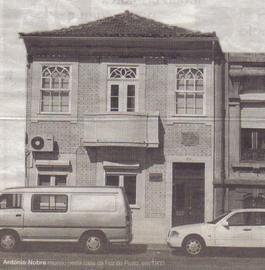
António Nobre’s House
-- Eugénio de Andrade
The house was small, in front of the sea.
It would be insignificant if António Nobre
Had not finished his days there:
He went there to die, with all his papers,
Sick of the world, his lungs all undone.
He was thirty-two—he’d written
Such a singular book
That it remains peerless even now.
The house is still there, and the Ox-
Drivers Square has changed only in name.
Today it’s the main avenue of The Foz.
The house has held up against the sun, and hasn’t been flattened
By the north winds. Petite bourgeois taste
Marks it more than vulgarity:
The walls covered with tiles,
The cement skirt around the balcony.
A discrete tailor has his workshop
On the lower floor, close to the ground,
But it’s a long time since a white dress,
Or the loosened laugh of some child,
Have graced the second floor balcony, or since
Anyone’s eyes were cast over the sea shimmering
Even in darkness. And the most attentive
Will not hear the shadowy voice of one who felt
Like “an orphan of caresses, a widower of hopes.”
Only from the rose acacia, on flaxen evenings,
Come whispers, sighs, fever.
Here is a translated Portuguese poem that goes against all of the precepts of post-post poetry and of what we should be doing now (3-D typography, formal or free, spatial or flarf, weather reports, documentary, identity-stoking, anti-poetic, video-looped, ecumenical, social rather than private, corporate as opposed to cottage, political not apolitical, warming not cooling). This poem is not “poetry by other means,” it is not experimental (though it suggests something too experimental for any experimentalist to experiment with). It evokes a single scene and holds it in a thin bezel of fact. The house is the objective correlative of a complex feeling, one of loss, of pining for the past, one which idealizes, though under the shadow of death, a poet long dead by a poet (now) recently dead. It is initially guarded and gradually opens until we reach the epiphanic conclusion. It reads like a free verse version of Yeats on the great houses of the Anglo-Irish aristocracy and yet the house in this poem couldn’t be any more modest or less aristocratic. It pays no attention to politics. It is more interested in the death of a poet than the life that led up to it. It doesn’t know whether it prefers the late 19th century, or the late 20th, though it recognizes that not all that much, at least as far as poets are concerned, has changed: a street sign and a peaceful sense of abandonment are all that seem different. It uses the changes in the house to describe how we have gotten to where we have gotten, how one period becomes another, and how certain things remain constant: the glimmering sea, the persistent shrubbery, the way poets accumulate their papers, their drafts, their projects, all of which take on an emblematic, almost religious importance, as though they were more material than the poet himself. It implicitly links the dead poet to the living poet, who can now draw his typologies: how poets live and die, alone (an orphan of caresses), how they are figures somewhat less robust than bankers or trolley drivers, consumptive (both a cliché and a deathly reality – Nobre died at the age of thirty-three), suffering from ennui, with the sea always near. It is not concerned with rupture. It is not concerned with making anything new. It is not concerned with being at least as well written as prose. It is more concerned with words than with breath, music than with white space, sincerity than with irony, description than with theory, continuity over the jagged precocity of collage. Things are put in their places and the result is as orderly as a well-kept cupboard. Our eyes follow the lines as though they were following a photograph by Eugène Atget, one of his empty Parisian squares, up to the balcony, down to the ground floor, out to the estuary. If not a poet on the upper floors, then a discrete tailor on the ground floor; if not vulgarity, then Petite bourgeois taste; if not insignificance, then just significant enough.
Some notes on the poets:
Eugénio de Andrade, arguably one of Portugal’s most important 20th century poets, died in 2005. António Nobre was considered by many to be the precursor to Portuguese modernism. I translated the poem a couple of days after Andrade died. There was a supplement in the Sunday paper that contained several poems and several articles. I was sitting at my kitchen table waiting to go to my in-laws for lunch (a Sunday ritual). The poem flowed like water from Portuguese into English. It took about five minutes to complete. I translated it right onto the newspaper, next to the original version. I love to translate poetry, but I am usually too busy translating other stuff, which, as I indicated in my last post, is not nearly so pleasant. Translating poetry or literary prose is a whole other order of language work.
Martin Earl lives in Coimbra, in central Portugal. From 1986 until 2001 he lectured in English, translation…
Read Full Biography

